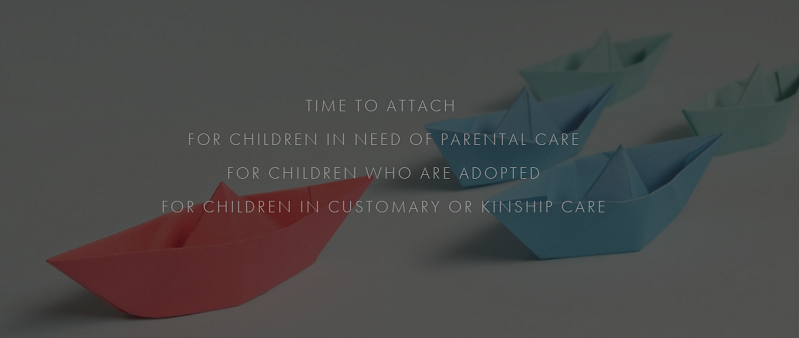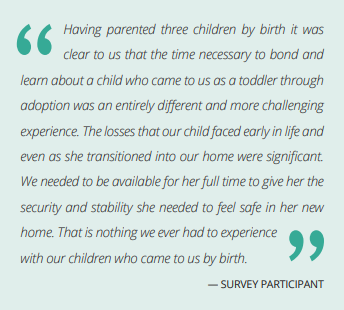EDITOR’S NOTE: This blog entry comes to us from Heather Stewart, M.A. Stewart is a Ph.D. candidate at Western University and is a member of the Time to Attach Research Team. Here, she speaks about the feminist bioethics issue of how family leave affects social and emotional bonding between parents and children, a classic structural issue affecting families and health. Stewart and the Time to Attach project give special attention to the needs of adoptive families. This work, while specific to the Canadian context, has implications for folks in all nations who wish to maintain or advocate for extended parental leave for both biological and adoptive parents.
It is a gross inequity that adoptive parents are not given the same benefits as biological parents. The argument of recovery from birth as a reason for treating biological mothers versus adoptive mothers as “separate but equal” masks a misguided, underlying belief that families built through adoption are less deserving of support. While I understand that women who have biological children need to recover from pregnancy and childbirth as well as bond with their children, adoptive mothers and their children also have unique needs related to adjusting to parenthood and building a strong bond with the child. Though an adoptive mother does not undergo physiological changes and recovery, the addition of a child requires significant emotional and psychological adjustment.

The quote above is taken from the qualitative portion of a recent survey administered by the “Time to Attach” research team,[i] and completed by 974 self-identified adoptive parents, awaiting parents (i.e., people awaiting an adoption they’ve been approved for), kin caregivers (i.e., biological family members who assume responsibility for a child of which they are biological kin), and customary caregivers (i.e., caregivers of First Nations, Inuk or Métis children who are not the children’s biological parents, according to the custom of the child’s band or First Nations, Inuit or Métis community) across Canada.[ii] The goal of the survey was to solicit the voices and input of parents and caregivers who are directly impacted by the current system of parental leave benefits in Canada, and to get a better understanding of their needs and wishes with respect to a potential revision to that system. An analysis of the survey data is part of a larger report, released this month (May 2019) by the Time to Attach team, which is arguing for 15 additional weeks of “attachment benefits” for adoptive parents in Canada[iii] (full report available here).
At present, the parental leave benefits structure in Canada allows both adoptive parents and biological parents to take what are called “parental benefits” for 35-40 weeks (standard benefits) or 61-69 weeks (extended benefits). However, biological parents are also eligible for “maternity benefits,” which give them an additional 15 weeks of paid leave. Our report and broader advocacy seek to call attention to this inequity and ultimately to have it rectified to ensure that the needs of adoptive parents are met to the same degree of those of biological parents.

The current inequality in parental leave, we argue, reflects the general misunderstanding that adoption is merely parenting minus pregnancy and birth. This is because, the justification for the additional leave time for biological parents (called “maternity leave”) is granted on the basis of the physical and psychological difficulties associated with pregnancy and giving birth. While of course our team fully recognizes and appreciates the unique mental and physical challenges associated with becoming a biological parent, especially for those who give birth, we call on the government to also pay attention to the unique challenges that accompany the process of bringing a child into one’s home through adoption. Anyone who has been involved in the process of adoption can vouch for the fact that adoption is far more than simply parenting minus pregnancy and childbirth!
The Time to Attach report zeroes in on some of the many unique challenges associated with adoption, especially the difficulties many adopted children have with forming secure attachments to their adoptive parents. This problem arises because, in many cases, adopted children have histories of trauma or instability, including but not limited to experiences of loss or disruption of connection to their birth parents, maltreatment by one or more previous caregivers, and/or multiple placements from foster care. These experiences can harm both the child’s ability to form new attachments with adults, but can also impede their overall social, emotional, and cognitive development.
In addition to highlighting these unique needs associated with adoption, our report calls on the Canadian government to both acknowledge and meet these needs in the form of a new category of parental leave benefits called “attachment benefits.” We propose that “attachment benefits” be (at the very least) equal to maternity benefits in terms of the benefit rate and number of weeks for which they are available; that like maternity benefits, attachment benefits should be available as early as 12 weeks before the expected date of arrival of the child and as late as 17 weeks after the placement date; that where there are two parents or caregivers, either one should be eligible to receive the attachment benefits; and, finally, that these attachment benefits (similar to maternity benefits) are offered in addition to paternal benefits for adoptive parents.
![The image is a quote from a survey participant. It reads as follows. "We adopted an older child with special needs
(autism and ADHA). The child had experienced
the death of two caregivers prior to being placed in foster
care. The cost of keeping this child in foster care, including medical care and other services (e.g., counselling), [is certainly higher than] the cost of [added] parental benefits for adoptive parents."](http://www.ijfab.org/blog/wp-content/uploads/2019/05/Time-to-attach-3.png)
The report offers three main arguments in support of these “attachment benefits.” The arguments are first, that adopted children need time to attach; second, that legal and international standards support time to attach; and third, that adoptive parents want time to attach and think it would benefit their families.
The first argument, that adopted children need time to attach, draws on the attachment literature within psychology to show that while adopted children often face difficulties with attachment, when they are adopted and given adequate time to attach to their new caregivers, they are often able to overcome these attachment-related challenges and have better long-term outcomes than they would otherwise. Importantly, adoption can serve as a healing or recovery mechanism for children who have developed insecure attachment patterns and/or have experienced adversity in their early childhood, though this of course takes time. Studies that we highlight in the report show that significant progress with attachment and trauma healing occur in the first year of an adoption, and that one year post adoption, adopted children tend to have lower rates of insecure attachment patterns than their counterparts who remain in the care of the state. Overall, we show that psychological literature on attachment (and the role of attachment in children’s development) support additional time to attach to support attachment, healing and/or recovery for adopted children.
Our second argument focuses on legal and international standards, which we argue support the addition of “attachment benefits” to the current EI parental benefits structure. This is because, according to prominent theories of legal discrimination, the current parental leave benefits system constitutes legal discrimination against adoptive parents by failing to equally recognize their needs, and by causing a “setback to their interests” on the basis of their family status (a protected category under the Canadian Charter of Rights and Freedoms). We also argue that the current system violates internationally recognized rights of the child, as outlined in the UN’s Convention on the Rights of the Child, of which Canada is a signatory. The report then compares Canada’s parental leave benefits system to that of other nations to show that Canada’s system is unusual with respect to comparable country’s offerings, and ought to follow suit with other similar nations.
Our third argument is driven by the perspectives of adoptive parents themselves, and shows that they want (and/or feel they need) the additional time to attach. Of the 974 survey respondents, 94% indicated that they supported our proposed “attachment benefits,” and 88% would have taken this additional leave if it was available to them. Importantly, the survey data helped us to highlight the costs associated with not having this additional leave time, with adoptive parents overwhelmingly indicating that the current system did not allow them sufficient time to bond with their adopted children, and for their adopted children to attach to them. Importantly, many survey respondents indicated that the lack of adequate time posed barriers for their decisions to adopt sibling groups or children with complex needs, including children with mental illness, cognitive disabilities, or physical disabilities. Adopting children with complex needs means more than overcoming barriers to attachment that are typically associated with adoption; they also mean navigating new worlds of social and medical support systems, and often arranging appointments with specialists or making changes to one’s home to accommodate the children’s needs. These are all dimensions of making a smooth transition during the adoption process that require more time than is currently granted to newly formed adoptive families.
On the basis of these three main arguments, we conclude that the Canadian government ought to offer “attachment benefits” to adoptive parents. And while we think these arguments are sufficient to ground the moral and political justification for doing so, we also anticipate that introducing “attachment benefits” would save the government money in the long term by having fewer adopted children using mental health and educational services and also having fewer of them remain in state care. Supporting “attachment” benefits is not only the right thing to do, it is also in the government’s economic interest to do it.
What is important to reiterate is that having the necessary time to
attach is truly in the best interests of adoptive children and families in
Canada. At present, the Canadian child welfare system is in a state of crisis,
with too many children flowing into the system (especially from marginalized
social groups, including Indigenous, African Canadian, and LGBTQ+ children) and
not enough of them leaving the system to find permanent, caring homes in which
they get the love and support they need to flourish. When children do have the opportunity
to join a family through adoption, allowing them the necessary “time to attach”
to their new parents or caregivers can help ensure that they will find the sort
of permanency and stability that lends itself to healing from past traumas and
instability, and ultimately giving them happier and healthier lives. This is
something that all Canadians ought to
care about, and we strongly hope that our report will lead to more support for
the creation of “attachment benefits.”
[i] The Time to Attach Research Team is comprised of faculty and graduate student researchers from Western University. The report was completed for Adopt4Life (A4L): Ontario’s Adoptive Parents Association and the Adoption Council of Canada (ACC), with funding support from Western University and the Conference Board of Canada.
[ii] While the majority (64%) of participants were from Ontario, there were at least one participant each from all provinces and territories, with the exception of Quebec and the Yukon. Residents of Quebec were not included in the survey, since Quebec has a different parental leave benefits system than the one in place throughout the rest of Canada.
[iii] The phrase “adoptive parents” will be used throughout the remainder of the blog for simplicity, though our report and our call for “attachment benefits” is intended to be inclusive of the needs of adoptive parents, kin caregivers, and customary caregivers alike.

